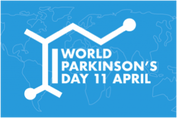 World Parkinsons Awareness Day - 11 April 2021 James Parkinson, English Surgeon, first described the effects of what we now know as Parkinson’s Disease. Parkinson’s New Zealand Website describes Parkinson’s as a progressive neurodegenerative condition. It is caused by insufficient quantities of dopamine – a chemical in the brain. Dopamine enables quick, well-co-ordinated movement. When dopamine levels fall, movements become slow and awkward. Parkinson’s has both motor and non-motor symptoms, and while it cannot be cured it can be treated. As Parkinson’s is a progressive condition it can often take many years to develop and has little effect on life expectancy. Different people will experience a different number and combination of symptoms. Parkinson’s is relatively common. Approximately 1 in 500 people have the condition. It becomes more common with older age groups, and it is believed 1% of people above the age of 60 have Parkinson’s. The average age of diagnosis is 59. Although there is a slight increase in risk of development of Parkinson’s in people who have family members with Parkinson’s, the risk is very low. Although there is a slight increase in risk of development of Parkinson’s in people who have family members with Parkinson’s, the risk is very low. Visit https://www.parkinsons.org.nz for more information The following are some interesting talks relating to Parkinson’s: “Deep brain stimulation is becoming very precise. This technique allows surgeons to place electrodes in almost any area of the brain and turn them up or down – like a radio dial or thermostat – to correct dysfunction. Andrea Lozano offers a dramatic look at emerging techniques in which a woman with Parkinson’s instantly stops shaking and brain areas eroded by Alzheimer’s are brought back to life” https://www.ted.com/talks/andres_lozano_parkinson_s_depression_and_the_switch_that_might_turn_them_off Listen to 'The chemistry of disease' on Radio New Zealand. Guy Jameson has been awarded the Beatrice Hill Tinsley Medal for his work understanding the chemical structure of proteins that are important in diseases such as Parkinson's. http://www.radionz.co.nz/national/programmes/ourchangingworld/audio/201815053/the-chemistry-of-disease If you or someone you know is struggling with Parkinson’s Disease our friendly
therapists can help, just contact us on: Phone: 03 377 5280 or email: [email protected] Comments are closed.
|
AuthorShonagh O'Hagan Archives
July 2024
|


 RSS Feed
RSS Feed